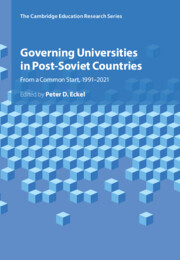Governing Universities in Post-Soviet Countries
University governance is an essential but complex phenomenon, even in countries where institutional-level governance has a long and strong tradition. After the dissolution of the USSR, each of the fifteen former Soviet countries developed their own University governance system and this groundbreaking book explores how these countries evolved from the “common start” of a unified and tightly controlled higher education system to shaping their own paths in higher education. Each chapter explores a different country, allowing University governance models to be compared and contrasted. The countries provide examples of a variety of different governance models – state-extended, academic-focused, internal/external, and external civic – and the book highlights the advantages and disadvantages of each relative to their context. It also presents innovative frameworks for understanding governance effectiveness in terms of autonomy, competition, and capacity. It is essential reading for researchers, students, and policy makers. This title is also available as open access on Cambridge Core.
Peter D. Eckel is Senior Fellow and Director of Leadership Programs at the Graduate School of Education, University of Pennsylvania. Notable publications include Practical Wisdom: Thinking Differently about College and University Governance (2018). He serves as a trustee at the University of La Verne in California and coleads the Penn Project on University Governance.

